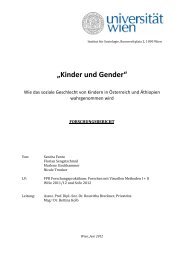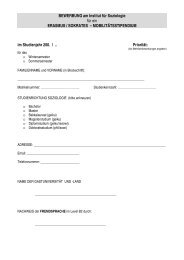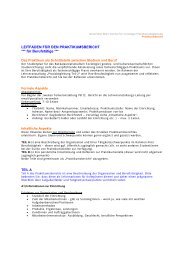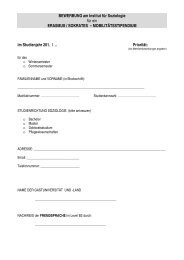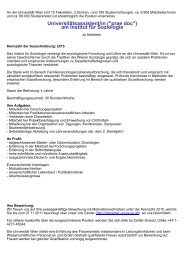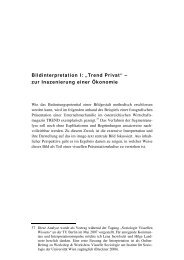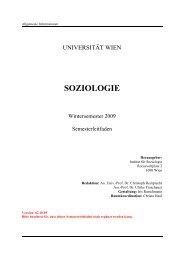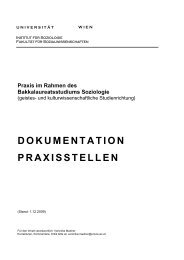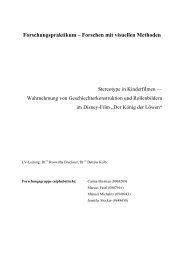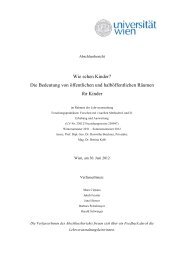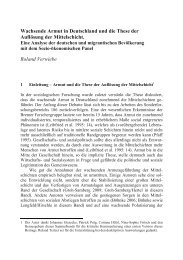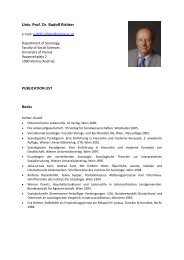Why do Europeans Migrate to Berlin? SocialStructural Differences ...
Why do Europeans Migrate to Berlin? SocialStructural Differences ...
Why do Europeans Migrate to Berlin? SocialStructural Differences ...
You also want an ePaper? Increase the reach of your titles
YUMPU automatically turns print PDFs into web optimized ePapers that Google loves.
8 Verwiebe<br />
population are rooted in the recent his<strong>to</strong>ry of the city. During the 1990s,<br />
de-industrialization, growth of the service sec<strong>to</strong>r and population decline<br />
led <strong>to</strong> a surplus of cheap housing in inner-city areas (Kra¨ tke, 2004). The<br />
inward migration of European nationals and West Germans were corresponding<br />
processes. Thus, the city symbolises the overcoming of divided,<br />
post-war Europe and the rapid societal changes in Germany and Europe<br />
since 1989. As Scott (2007: 8) states, <strong>Berlin</strong> is now well integrated in<strong>to</strong><br />
the global economic system and whilst it ‘‘… may not stand out in terms<br />
of its position within the global urban hierarchy, … [<strong>Berlin</strong>’s] progress<br />
since 1989 has been extremely significant’’.<br />
In terms of labour market structures, the economic activity rate is relatively<br />
high. It s<strong>to</strong>od at circa 70 per cent for women and 80 per cent for<br />
men in 2006. With more than 80 per cent of the jobs, the service sec<strong>to</strong>rs<br />
(media, research, government, education, consulting, advertising, commerce)<br />
are much more important than construction and manufacturing<br />
(SÖSTRA, 2007: 117), in which approximately 250,000 jobs were lost<br />
between 1991 and 2005 (SO¨ STRA, 2007: 12). Thus, traditional German<br />
industries ‘‘like textile or metal processing, as well as technology-centred<br />
industries like vehicle manufacturing or mechanical engineering, are far<br />
less represented in <strong>Berlin</strong> than in the other urban economic centres of<br />
Germany’’ (Krätke, 2004: 512). <strong>Berlin</strong> is host <strong>to</strong> fewer company headquarters<br />
than other major cities of its size. However, several companies<br />
(e.g., Deutsche Bahn, Sony Europe, Air <strong>Berlin</strong>, KPMG, Bayer Schering)<br />
have relocated their headquarters <strong>to</strong> <strong>Berlin</strong>, due <strong>to</strong> the modest economic<br />
recovery of recent years. 5 In the context of the late, but massive tertiary<br />
restructuring of <strong>Berlin</strong>, Kra¨ tke (2004) has argued for the development of<br />
a ‘‘creative class’’ in <strong>Berlin</strong>, the ‘‘city of talents’’, based around the<br />
media industry, software production, advertising and research.<br />
It can be assumed that this local context has consequences for the social<br />
composition of migrant populations and the shaping of migrant biographies.<br />
In the 1960s and 1970s (West) <strong>Berlin</strong> was a major destination for<br />
classical intra-European labour migrants, who were seeking employment<br />
in manufacturing. This changed <strong>to</strong> some degree throughout the 1980s<br />
when – unlike other cities in Germany – cultural ⁄ lifestyle-based migration<br />
became more important. For more recent migration processes, there<br />
is a tendency, in comparison <strong>to</strong> the period of pre<strong>do</strong>minantly lower-class<br />
labour migration of the 1960s and 1970s, <strong>to</strong>wards an increasing portion<br />
of migrants belonging <strong>to</strong> an ‘‘emergent migrant middle class’’ (Verwiebe,<br />
2008) or <strong>to</strong> the growing ‘‘creative class’’ of <strong>Berlin</strong> (Kra¨ tke, 2004: 512).<br />
However, it seems mostly an empirical question what reasons for migra-<br />
Ó 2011 The Author<br />
International Migration Ó 2011 IOM



